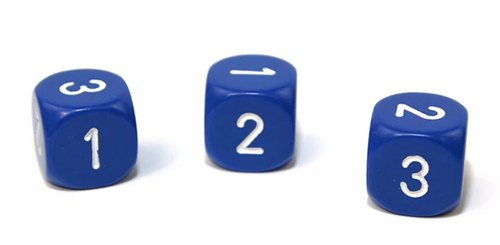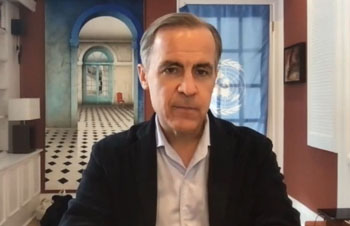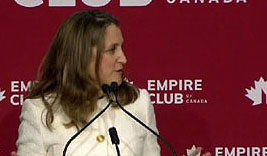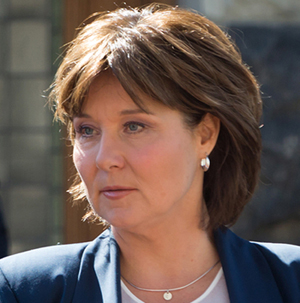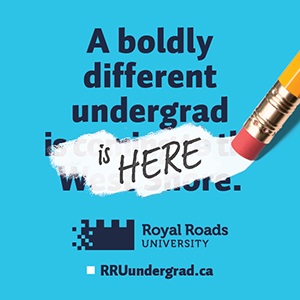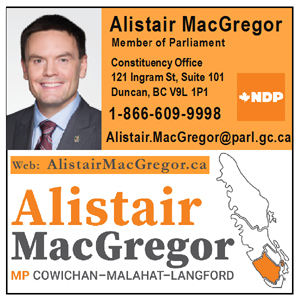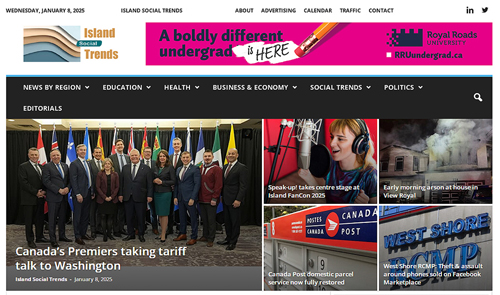Sunday January 12, 2025 | VICTORIA, BC [Posted at 6:40 pm | Updated January 16, 2025]
Political editorial analysis by Mary P Brooke | Island Social Trends
In the Ottawa media bubble there’s a lot of talk that prematurely simplifies the Liberal Party of Canada leadership contenders list.
One of the benefits to a short timeline to find a new Liberal leader is that hopefully an attentive public won’t lose interest. The stakes are too important to let public interest slide.
The current national media spin is that the race is already down to three front runners. That perhaps makes political news shows presentations to manage but it doesn’t necessarily serve the public interest of Canadians.

Yes, two other candidates who have declared for sure that they’re in the race (Chandra Arya and Frank Baylis) are likely not front runners, mostly due to lack of anything close to a national profile and more of a focus on business efficiencies than public policy.
But there are some key and very competent cabinet ministers who are apparently still thinking about committing to the Liberal leadership selection process who should not be overlooked. They are competent and have a relatively broad national profile at least in certain sectors. That would include Jonathan Wilkinson and François-Philippe Champagne.
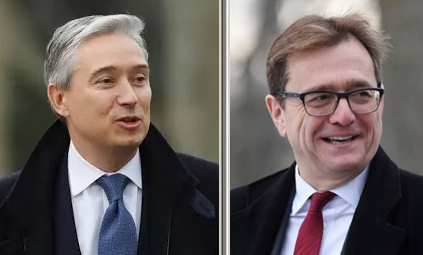
It will be members of the Liberal Party of Canada who will select the next prime minister, not the general voter base of Canada. But public opinion will likely have some influence on membership votes.
So let’s not jump the gun here and give democracy a chance. For media and pundits to essentially pre-select three front runners might seem efficient for the sake of political debate on TV or in large corporate national newspapers, but may well be undercutting the opportunity for a more thorough exposure of potential candidates to the general Canadian public.
And who’s to say the ‘top three’ is a correct assessment so soon in the process?
Who might be running:
Mark Carney has no front line retail political experience and in previous possible opportunities to run his family has apparently influenced his decision not to run.He will not appeal to the average Canadian voter who is currently disenfranchised with the Liberals; he may in fact turn voters toward the Conservatives who are tapping into the public anger and angst about the cost of everything. [Update January 16, 2025: Mark Carney announces his Liberal leadership campaign]
If Carney does end up being the front runner it only proves how little the Liberal party has shifted from its old Ontario roots. Carney was born in the North West Territories but he brings absolutely none of that to the public eye; he brings Bay Street and old money.
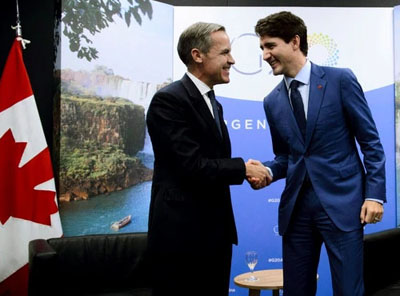
In terms of any public profile, Carney rides on his success in being the Governor of the Bank of Canada (though Prime Minister Harper’s Finance Minister at the time, Jim Flaherty, did more to help Canadians pull out of the recession than the central bank ever did) and then the Governor of the Bank of England.
However, Carney did in 2016 warn of the societal risk of “staggering wealth inequalities” in a Roscoe Lecture at Liverpool John Moores University. That inclination to analyze the current economic system may be what appealed to Trudeau (the prime minister relied on Carney as an economic advisor over the years).
Chrystia Freeland is obviously well known across the country having been the right-hand operator beside Trudeau for about 10 years, most recently as Finance Minister and Deputy Prime Minister. She also won’t be straying far from the Liberal mainstream. Despite her Alberta roots she is a big city operator who never really demonstrated being in touch with the challenges of everyday Canadians.
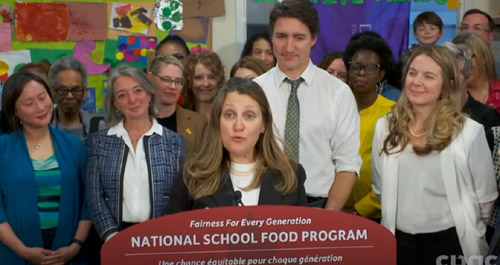
She also has an awkward way in front of TV cameras despite having worked for several years as a pundit in USA TV media. For good or bad, the visual-image political frame for politicians is long-embedded in electoral success (it actually started as far back as Ronald Reagan in the US who used his acting career star quality to his party’s great advantage).
The national media lauded the style of her sudden resignation but that move didn’t really help Canadians and left the Liberal Party in disarray. No favours there.
Christy Clark is being already called the ‘dark horse’ of the Liberal leadership race, i.e. a previously lesser-known person who emerges to prominence in a situation. Too bad Clark had some measure of electoral success limited to BC politics because the rest of Canada never witnessed or experienced the miseries and damage that she left in her wake — something took the NDP under John Horgan took to fixing, and the damage is still not fully repaired (some if it irreversible such as impacts on families through a beaten-down education system).
Large national media does a great disservice to the rest of Canada by giving any sort of favourable airtime to the possibility of a successful Clark campaign. Clark uses an old style of old-boys-network and corporate politics where ‘anything goes’ in order to achieve success — say anything you like just in case everyone believes it.
Clark has been a political pundit mostly on the CTV network in recent years; this has given her some high-profile exposure to politically-engaged audiences.
But it would be prudent to remember that in 2017 Clark was asked by the Lieutenant Governor of the day (Judith Guichon) to step back from being Premier, even after winning a majority of seats in the May 2017 BC provincial election. That wasn’t some tricky political manoeuvre as the legislative press gallery might have painted it; people were actually tired of how she treated the resources and reputation of the province and the Queen’s representative in Canada (the LG) knew it.
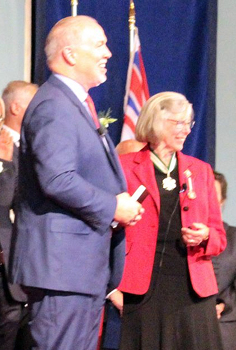
Clark also isn’t yet accomplished in speaking French; she admitted this week that her French-speaking skills are a work in progress. It’s been a recent project, rather last-minute if actually considering a federal race. Oral French skills in a prime ministerial candidate need to be level to handle a real-time debate or live media questions; Canada seems to want that in a suitable candidate or at the very least it will be needed in order to have any political discourse with Quebec.
It’s probably time to have a BC-based prime minister — some options might include Jonathan Wilkinson (North Vancouver) or Terry Beech (Burnaby North-Seymour), but a little more tire-kicking is needed with regard to Clark as an option.
Who else might run:
With the limited time most people have for paying attention to the machinations of national politics, their time is probably best served in getting to know about serious candidates who won’t be more of the same.
That short list would presently include Wilkinson and Champagne, both of whom have said they are giving serious consideration to running for the top job. Current Government House Leader Karina Gould might throw her hat into the ring.
Already known to not be running in this leadership round are current high-profile cabinet ministers Dominic LeBlanc (Public Safety and Intergovernmental Affairs), Melanie Joly (Foreign Affairs), and Steven MacKinnon (Labour). They say they want to focus on serving Canadians in important areas at a critical time of Canada-US relations but they probably also see that the next new prime minister will be doing yeoman’s work to keep the party together and moving forward.
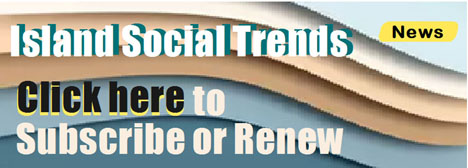
Highly competent cabinet minister Anita Anand (Minister of Transport and Internal Trade) who handled procurement during the pandemic is not seeking re-election in this year’s federal election.
Whoever wins as Liberal leader will not only likely be in that Official Opposition role (unless the Bloc and NDP produce some surprises) but will be saddled with rebuilding the party. LeBlanc, Joly and MacKinnon will probably get plum positions in the next cabinet or opposition shadow cabinet; they don’t need to be distracted by having to do caucus management.
Short timeline, possibly toward Official Opposition:
Short timeline should not be distraction:
Civic literacy is required here. People need to do their homework and listen to a range of media sources. The stakes are just too high to bring in a new prime minister
While the projected time frame is considered to be short for whoever becomes the new prime minister (candidates must submit their applications by January 23, Liberals who wish to vote in the leadership race must register by January 27, and the Liberals will announce their new leader to Canadians by March 9), it doesn’t really stop there.
Might end up as Official Opposition:
The person who overnight becomes the next Prime Minister of Canada will lead the Liberals in a mid-year or fall season election and possibly end up becoming the Leader of the Official Opposition (if Pierre Poilievre manages to pull off a Conservative majority win).
It will be important that a Liberal opposition be able to effectively hold Conservative feet to the fire.
As Trudeau heads to the door:
Trudeau meanwhile continues serving as PM:
So while Trudeau may now be in a traditional ‘lame duck’ position (i.e. not being able to wield as much power in his party because he’s heading for the exit) he is still doing a yeoman’s job in appearing on large US TV networks to push back against the president-elect’s bullying against Canada. That doesn’t look anything like someone who doesn’t care or who doesn’t still take his job seriously.
Anything that requires prime ministerial oversight or approval is still going through Trudeau or his office.
The so-called ‘radical center’:
And with all due respect, former Prime Minister Jean Chretien is not helping with his call to the Liberal flock that they return to ‘a radical centre’.
Trudeau has done a lot of good for this country by bringing in social policy that actually took some short-term alignment with the NDP to achieve. He maintained the Liberal power and did not give room for the NDP to expand.
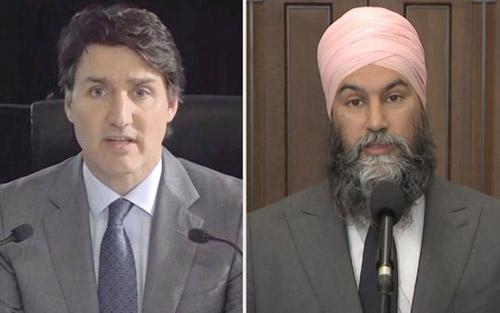
Politically speaking he pulled off an important set of improvements for Canadians that were long overdue (e.g. dental plan, child care, more funds to provincially-run school food programs, and the start of national pharmacare) on the backs of the NDP.
NDP should get the credit for those achievements but the Liberals get the glory for ushering through the legislation.
PM underestimated:
For national media and various political pundits (and some lesser known MPs) to be chiding Trudeau for staying on too long and ‘not being able to take a hint’, they actually have missed the elegant nuance of how Trudeau moved the country forward as “a radically transformed Canada” as NDP MP Alistair MacGregor puts it — by using the might of a Liberal majority then two minority governments to achieve things for the benefit of everyday people.
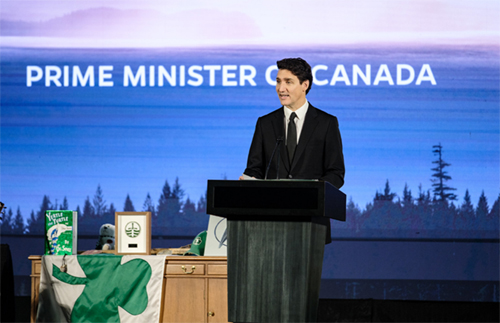
For sure, Trudeau neglectfully ended up allowing serious problems to develop in housing and immigration (leading to serious cost of living challenges for many Canadians), both of which deserve intense rebuke. He also gained no favour with people in moderate-to-higher income ranges with various type of tax clawbacks.
But there in the current shallow analysis of Trudeau’s work there is much lack of understanding of how the political system works for the long-term. We can already recognize success for Canadians in areas like women’s participation in society and also Indigenous reconciliation.
He may well also later on be recognized for having used the might of the Liberal machine (with influences from the NDP) to soften the harsh edges of society for the much longer term (e.g. his efforts on addressing gun control and finally opening up examination of punitive bias against women in the RCMP).
===== RELATED:
- Mark Carney launches Liberal leadership campaign (January 16, 2025)
- Clark is out of the federal Liberal race (January 14, 2025)
- Former B.C. premier says she ‘misspoke’ when claiming she was never a Conservative (CTV / January 11, 2025)
- Liberals to produce new prime minister by March 9 (January 9, 2025)
- Poilievre shifts Trudeau-taunts to all potential leadership Liberal candidates (January 9, 2025)
- BC can do better than Ms Clark for Liberal leadership (January 8, 2025)
- Parliament on pause as Liberals choose new leader (January 6, 2025)
- This is a radically transformed Canada says Alistair MacGregor MP (December 18, 2024)
- RELATED NEWS SECTIONS: POLITICS | CANADIAN FEDERAL ELECTION 2025


